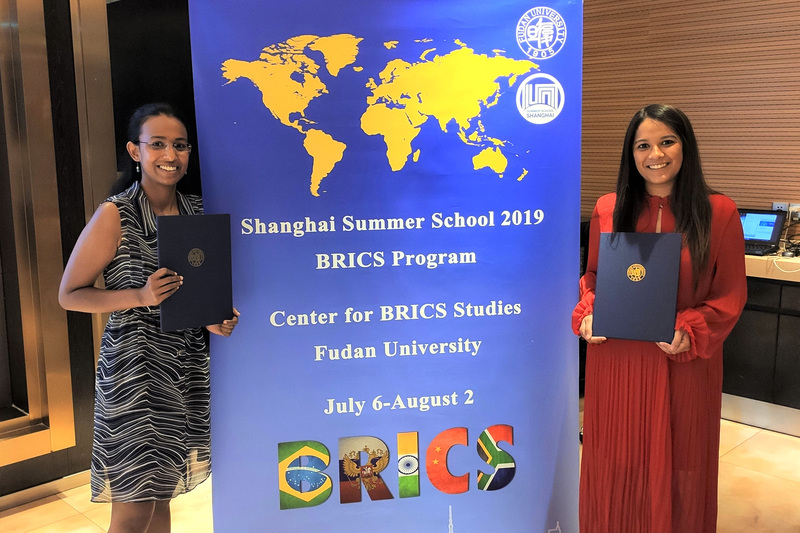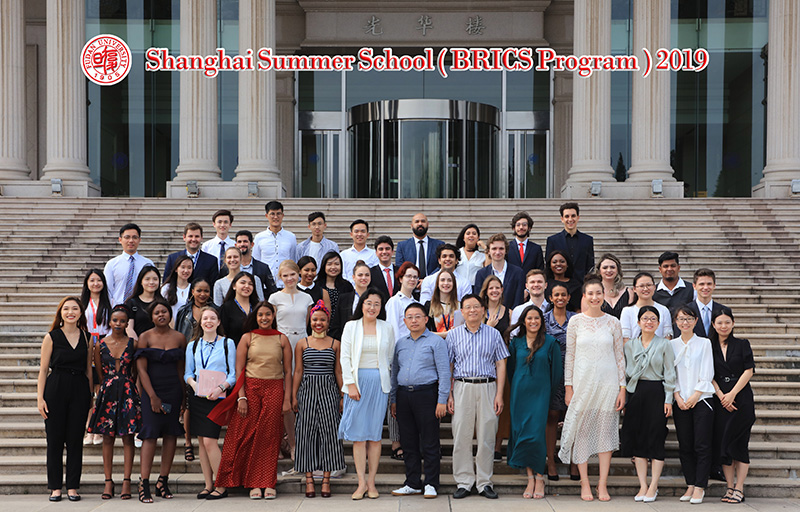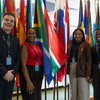Lessons from Shanghai
22 August 2019 | Story Carla Bernardo. Photos Supplied. Read time 6 min.
Two students from the University of Cape Town (UCT) recently returned from representing South Africa at the 2019 Shanghai Summer School (BRICS Program). The two spent a month learning alongside other young leaders from across the Brazil, Russia, India, China and South African (BRICS) alliance.
PhD candidate Mandira Bagwandeen and international relations honours student Aaliyah Vayez were among the cohort of 38 students and young researchers selected from a pool of applicants from all five BRICS countries to take part in the programme.
The summer school provides an opportunity for the participants from BRICS countries to live and study in Shangai, China for a month. The two main courses of study focus on “global governance and cooperation among BRICS” and “Chinaʼs politics and diplomacy”.
Bagwandeen and Vayez came across the programme via UCT’s political studies department which often shares opportunities like the annual summer school with students.
Based at Fudan University in Shanghai, the participants attended daily lectures and simulations, were exposed to academics and industry leaders from the BRICS nations, and went on cultural tours to better understand Chinese development.
It was the UCT studentsʼ first visit to China and they were excited to share their experiences and lessons learned, both in and outside the classroom.
“It was eye-opening … an unforgettable experience,” said Bagwandeen.
“Shanghai is a symbol of China’s astounding economic growth.”
Walking around Shanghai, she was constantly in awe of the soaring skyscrapers but, equally, its colonial and traditional architecture that served as a reminder of its past. Impressive too was the efficient public transport system and the “hard-working ethic”.
Cultural exchange
Vayez, who was one of the youngest participants and delivered the commencement address, echoed Bagwandeen’s observations. She said she was pleasantly surprised to encounter places, people and customs that “were authentically Chinese”.
“The constant development of infrastructure, technology and expansive job market opened my eyes to the very visible ways in which China continues to challenge the world’s idea of development, modernisation and cultural exchange,” she added.
The biggest culture shock for her was “definitely the food”.
“There was very little variety of halaal food available but tasting authentic Chinese staples like noodles, rice and even bubble tea was immensely memorable,” said the practising Muslim.
While there were many highlights, the two whittled their lists down to their top experiences.
For Bagwandeen, it was the lectures, classes – such as a kung fu session – and culture-sharing between participants, a visit to the opera, seeing the New Development Bank headquarters and, most notably, making many new friends.
“I can now say that I have friends from every BRICS country,” she said.
Top of Vayez’s list was a boat ride along the Huangpu River where “old” and “new” Shanghai meet, a visit to Shengzhou and its factories, and the tours she took with other participants to sites like The Bund (Waitan), Longhua Temple, Zhujiajiao Ancient Water Town and Yuyuan Garden.
“I was able to immerse myself into Shanghai, interact with its people, get lost in and among its streets and navigate my way through cultural, linguistic and historical differences,” she said.

Lessons learned
An important insight Bagwandeen will be bringing back to UCT is her now-richer understanding of China’s economic development. She will use this in her tutoring and teaching topics on development.
On a personal level, she hopes to emulate the “Chinese work ethic”. Even though she believes it is something you grow up practising, it is worth aspiring to, she said.
The programme provided Vayez with an immense learning opportunity about the global south and diversity.
“I am now extremely [well] equipped to incorporate what I’ve learned into my course work and academic discussions at UCT and in South Africa,” she said, noting that she’d be using the new insight in class and academic writing.
Living, learning and exploring alongside the members of the diverse group was an opportunity to experience “south-south cooperation”, she added.
Through her interactions with the other participants, she benefited from constantly engaging across cultural, language and “intellectual differences”.
She also discovered firsthand the common will among BRICS youth to “enact sustainable and effective cooperation, embodying the principles of independence, self-sufficiency and ongoing development for countries in the global south”.
“I learned that no meaningful dialogue on development and cooperation can take place without the incorporation of the voices, diversity and views of the youth – the potential we hold is unmatched,” Vayez said.
 This work is licensed under a Creative Commons Attribution-NoDerivatives 4.0 International License.
This work is licensed under a Creative Commons Attribution-NoDerivatives 4.0 International License.
Please view the republishing articles page for more information.










